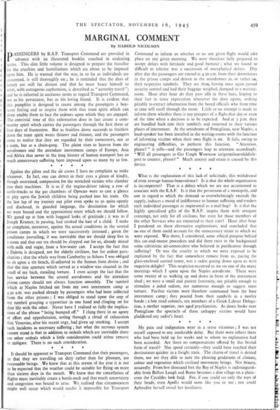* *
It should be apparent to Transport Command that their passengers, in that they arc travelling on duty rather than for pleasure, are reasonable beings. We knew that at this season of the year it is not to be expected that the weather could be suitable for flying on more than sixteen days in the month. We knew that the cancellation of flights must inevitably create a bottle-neck and that much uncertainty and congestion was bound to arise. We ealised that circumstances might well occur which would render it impossible for Transport Command to inform us whether or no any given flight would take place on any given morning. We were therefore fully prepared to accept delays with fortitude and good humour ; what we found so difficult to tolerate was a succession of unexplained delays. Day after day the passengers are roused at 4.30 a.m. from their dormitories in the prison camps and driven to the aerodromes in, or rather os, their respective tumbrils. They are then, having once again passed security control and had their baggage weighed, dumped in a waiting- room. Hour after hour .do they pass idly in these huts, leaping to their feet in tense expectation whenever the door opens, seeking pitiably to extract information from the bored officials who from time to time will stroll through the room. Little or no attempt is made to inform them whether there is any prospect of a flight that day or even of the time when a decision is to be expected. And at 3 p.m. they are bundled back into their tumbrils and returned to their various places of internment. At the aerodrome of Pomigliano, near Naples, a loud-speaker has been installed in the waiting-rooms with the function of informing victims when their own flight is on. It fails, owing to engineering difficulties, to perform this function. "Attention, please! " it yells—and the passengers leap to attention accordingly. "Will all passengers to Grr Umph Wowwow iarigrrmilanenfiddizle- port to counter, please?" Much anxiety and strain is caused by this device.






























 Previous page
Previous page